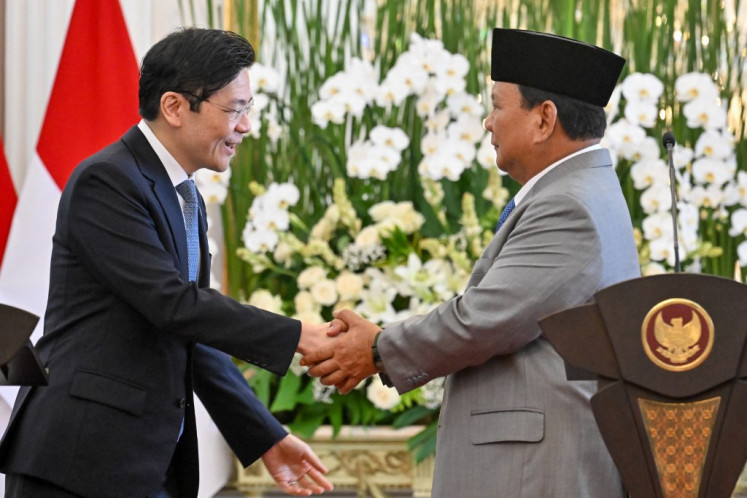Not 'godless': Followers of indigenous faiths fight for recognition
As 81-year-old Subrata listened to a gong echo during a celebration of his ancient indigenous faith, he betrayed little of the trauma of a lifetime of discrimination deriding him as "godless".
Change text size
Gift Premium Articles
to Anyone

A
s 81-year-old Subrata listened to a gong echo during a celebration of his ancient indigenous faith, he betrayed little of the trauma of a lifetime of discrimination deriding him as "godless".
He was enjoying a cleansing ritual for younger followers of the Sunda Wiwitan religion in West Java, where they are often derided as infidels, primitive or faithless idolaters.
Sunda Wiwitan believers are pushing for official recognition of their shunned faith, which has existed longer than Islam and Christianity in Indonesia.
"I hope people will no longer treat God's creatures differently," Subrata told AFP between rituals in Cigugur village.
Sunda Wiwitan believers face significant hurdles, including policies that bar them from government jobs and having their marriages officially recognized.
"I am a citizen of this country, yet I am ostracized on my land," said Subrata.
Around him, preparations were underway to celebrate Seren Taun, the annual harvest festival outlawed from 1982 until the end of Suharto's dictatorship in 1998.
Before a ritual known as Pesta Dadung to protect crops from ruinous pests, men dressed in black solemnly chanted prayers while lighting a fire, as women in white kebaya sang in a traditional Sundanese language.
Sunda Wiwitan venerates the spirits of followers' ancestors as well as the power of nature, causing misconceptions that they revere dead objects.
Before he retired from the civil service, Subrata said he was repeatedly denied promotions and interrogated because he was deemed "godless" by his then-boss.
"God destined me to be a believer of Sunda Wiwitan, but after I was born, I was treated differently. Of course, it hurts," he said.
Later, the government barred native faith believers from applying for civil service jobs altogether.
Despite the religion's centuries-long existence, Sunda Wiwitan followers continue to face barriers to their ability to practice their faith and access other rights.
Before 2017, more than 10 million native-faith followers were required to fill the religion field on their ID cards with a dash.
The move created several bureaucratic roadblocks for believers, including renewing driving licenses, applying for certain jobs or undertaking other official administrative tasks.
In 2017, Indonesia's Constitutional Court allowed native faith followers to fill the religion column with a generic phrase: "the Belief in God Almighty".
But bureaucratic problems remain.
Some are reluctant to renew their ID cards because they cannot state their actual religion.
"We are all different. Why do we need to be lumped into one term?" asked Dewi Kanti Setianingsih, an advocate for Sunda Wiwitan rights.
Without a listed religion, people cannot register their marriages legally, forcing some women into unofficial nuptials that carry further stigma in Indonesia.
"Their children's status will not be acknowledged by the law and they will be considered as children born outside of marriages," said Setianingsih.
Followers say they face more obstacles than other religions and local authorities have also moved to shut down their tombs, citing a lack of permits.
"We are still fighting because there are still articles [...] that are discriminatory," Ira Indrawardana, an anthropologist at Padjadjaran University who practices Sunda Wiwitan, told AFP.
The government, however, denies discriminating against the community.
"The ministry can't provide such service for that many religions so we decided on a universal term," said Sjamsul Hadi, senior official at the Education, Culture, Research and Technology Ministry.
Sunda Wiwitan followers numbered as many as 15,000 in the early 1960s, said Setianingsih.
More precise estimates are hard to come by because many hide their faith.
As a child, Restu Buana would call himself a Catholic for fear he would be bullied if his true religion was known.
When his religious studies teacher found out, he condemned Sunda Wiwitan as a culture that was “not a religion", the 20-year-old student said.
He now settles for a dash on his ID card.
"What I want is not to have a religion column on our ID card. Religion is a private matter, whatever people practice is their right and must be respected," he said.
Some Sunda Wiwitan followers believe involving other religions in their sacred harvest rituals could help fix misconceptions.
They are also working with NGOs and religious organizations to clarify misunderstandings about their faith.
Others have lobbied the government through the rights commission, filed court requests to recognize marriages or led protests against tomb closures.
"If Indonesia wants to be seen as the beacon of diversity, it has to embrace differences," Indrawardana said.









